You have 2 electricians point of view. We both recommend GFI but differ on ground probes. I have only been in the trade 17 years. I also have my administrator licence and contractor license.
Navigation
Install the app
How to install the app on iOS
Follow along with the video below to see how to install our site as a web app on your home screen.
Note: This feature may not be available in some browsers.
More options
You are using an out of date browser. It may not display this or other websites correctly.
You should upgrade or use an alternative browser.
You should upgrade or use an alternative browser.
Any electricians on here? I have a question about stray voltage.
- Thread starter shoelaceike
- Start date
- Tagged users None
Thoughts on arc fault requirements and fish tanks?You mention stray voltage and stray current in a tank. They are two different concerns. The stray voltage in your tank is normal and every tank has it. If you have measurable current in your tank you have a much bigger line voltage problem and will get yourself electrocuted if you stick your finger in there. Use a GFCI and ground probe. That is all I would like to add to this thread as these electric threads can go on for years and become nothing but arguments. Good luck and stay safe. Have fun
(Master Commercial Electrician Manhattan 40 years)
- Joined
- Aug 3, 2015
- Messages
- 126
- Reaction score
- 41
What do those of us who live in houses that do not have grounded Outlets do?
You have options. Replace the circuit breaker with a gfi breaker is one. Replace the first receptacle on the circuit with a gfi outlet is another. If you don't have a ground with your wire it's old! Replacing wire that old is best but can be expensive. I have rewired a ton of houses. When lath and plaster is removed you can usually find multiple places the house almost had an electric fire. Wood seriously scorched. If you have really old wire and don't replace it I recommend led lights replacement.
- Joined
- Jul 28, 2015
- Messages
- 4,668
- Reaction score
- 3,189
There's a sticky somewhere on grounding probes and as PaulB said there's many decades of discussion back and forth about them so I'll skip that part. Otherwise...
My standard copy paste for electrical safety concerns and recommendation for a CAFCI and GFCI circuits.
On CAFCI, GFCI, and Surge Protection to protect your house, yourself, and your equipment.
I like redundancy and as much protection against equipment failures as possible. Things like Heaters and power strips in our hobby have created more havoc then necessary with the occasional fun dip of lights into the tank...
I would also suggest a CAFCI along with GFCI
CAFCI will help protect your house from fire
GFCI will help protect you from electrocution
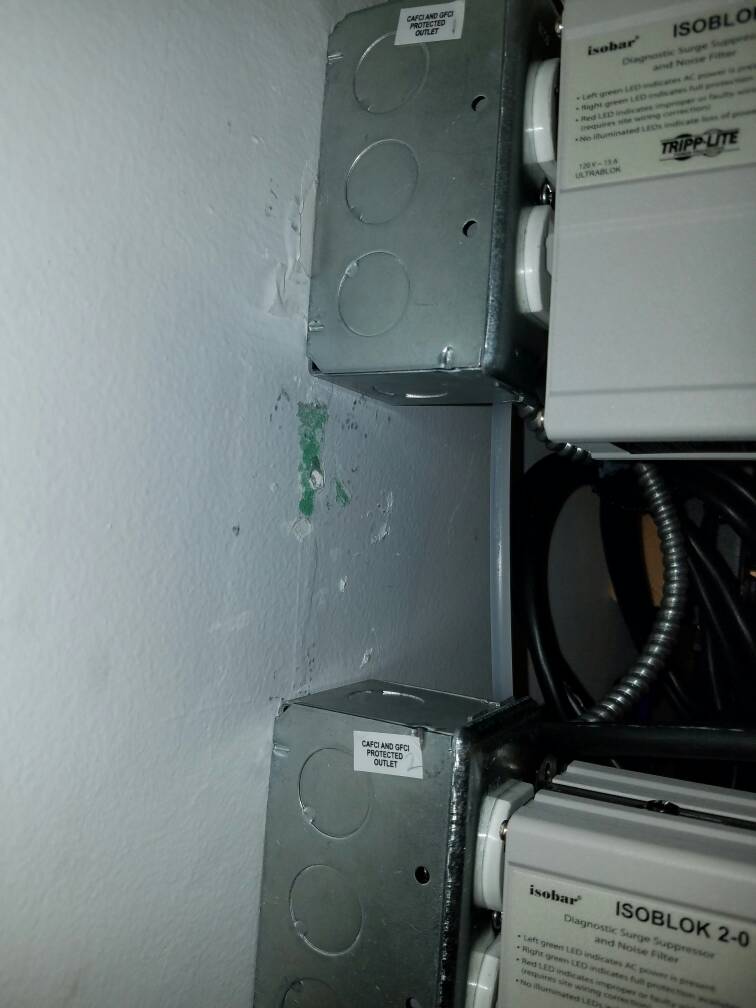

And a good surge protector will help protect your equipment.
Individual one shown above. Tripplite makes some good ones. Be warned some newer surge protection devices will stop power from flowing all together once it can no longer provide surge protection. This is actually a good thing IMO for many things like computers/tv/etc but NOT a good thing, again IMO, for many other things like refrigerators, freezers, our aquariums, etc. Some will make an audible alarm when exhausted which is nice too.
Plus a whole home. None last forever and will need replaced eventually based on how many surges and intensity of surges they've been hit by. Surges can come from outside your home, not just lightening strikes, and from inside the home.
Eaton Ultra and SquareD hepd80 are a couple good whole home surge protectors.
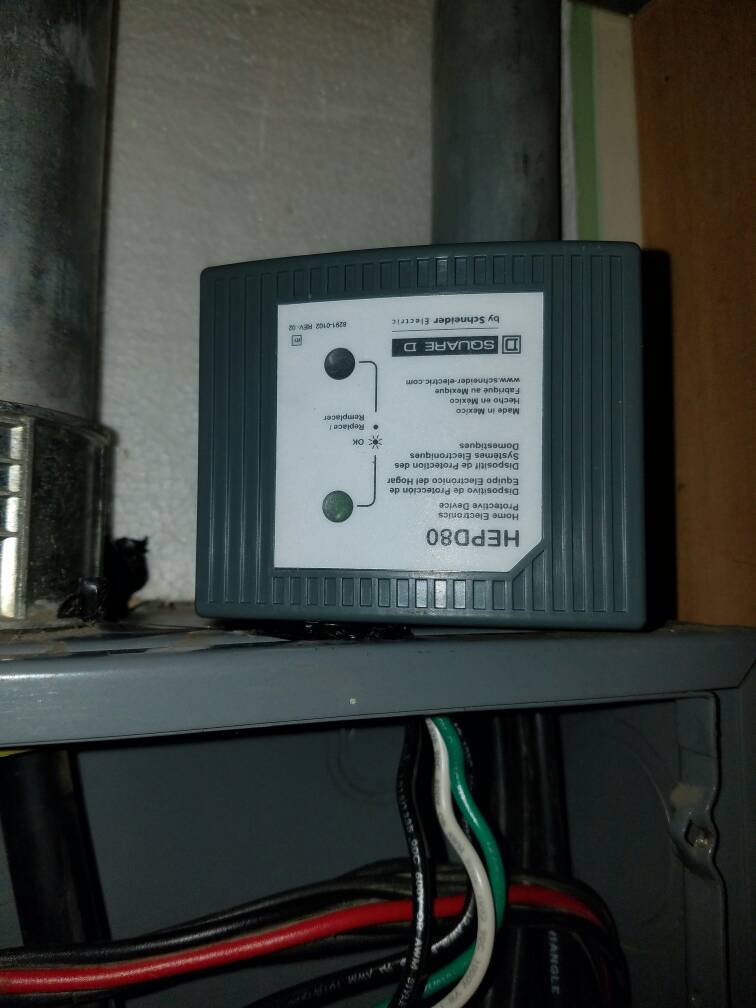
Plus having more then one circuit with life support spread across them. I have two additional circuits then what's pictured above to my main tank on the first floor with GFCI at the receptacles so its easier to reset them if tripped. Then the two shown in the picture above go to my basement sump with the GFCI at the breaker. Along with being a CAFCI. There are also AFCI breakers but don't protect against as many arc faults as a CAFCI.
And don't get confused by combination AFCI (CAFCI). That doesn't mean it combines GFCI with it. The packaging has to specify GFCI as well to support both CAFCI and GFCI. Sometimes called dual.
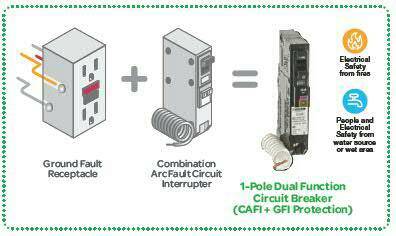
Here's some visuals
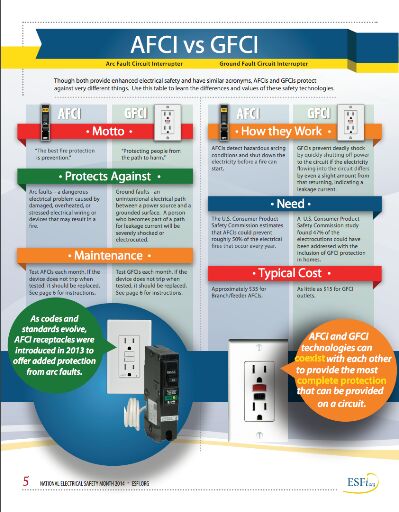

And CAFCI protects against both of these where AFCI only parallel
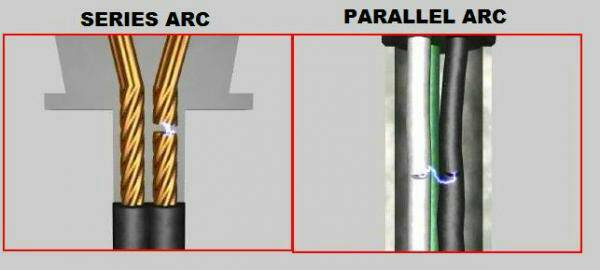
In the US the NEC will typically require a class A GFCI protection in places like a bathroom (fishtank) which trips at 6mA. Some places like commercial applications can use class C, D, or E that trip at 20mA.
http://m.csemag.com/index.php?id=9575&tx_ttnews[tt_news]=102229&cHash=89c8746cdc4a7fd8a3cb93f1d51ba57a[/URL
My standard copy paste for electrical safety concerns and recommendation for a CAFCI and GFCI circuits.
On CAFCI, GFCI, and Surge Protection to protect your house, yourself, and your equipment.
I like redundancy and as much protection against equipment failures as possible. Things like Heaters and power strips in our hobby have created more havoc then necessary with the occasional fun dip of lights into the tank...
I would also suggest a CAFCI along with GFCI
CAFCI will help protect your house from fire
GFCI will help protect you from electrocution


And a good surge protector will help protect your equipment.
Individual one shown above. Tripplite makes some good ones. Be warned some newer surge protection devices will stop power from flowing all together once it can no longer provide surge protection. This is actually a good thing IMO for many things like computers/tv/etc but NOT a good thing, again IMO, for many other things like refrigerators, freezers, our aquariums, etc. Some will make an audible alarm when exhausted which is nice too.
Plus a whole home. None last forever and will need replaced eventually based on how many surges and intensity of surges they've been hit by. Surges can come from outside your home, not just lightening strikes, and from inside the home.
Eaton Ultra and SquareD hepd80 are a couple good whole home surge protectors.

Plus having more then one circuit with life support spread across them. I have two additional circuits then what's pictured above to my main tank on the first floor with GFCI at the receptacles so its easier to reset them if tripped. Then the two shown in the picture above go to my basement sump with the GFCI at the breaker. Along with being a CAFCI. There are also AFCI breakers but don't protect against as many arc faults as a CAFCI.
And don't get confused by combination AFCI (CAFCI). That doesn't mean it combines GFCI with it. The packaging has to specify GFCI as well to support both CAFCI and GFCI. Sometimes called dual.

Here's some visuals


And CAFCI protects against both of these where AFCI only parallel

In the US the NEC will typically require a class A GFCI protection in places like a bathroom (fishtank) which trips at 6mA. Some places like commercial applications can use class C, D, or E that trip at 20mA.
http://m.csemag.com/index.php?id=9575&tx_ttnews[tt_news]=102229&cHash=89c8746cdc4a7fd8a3cb93f1d51ba57a[/URL
Last edited:
- Joined
- Jul 28, 2015
- Messages
- 4,668
- Reaction score
- 3,189
I've heard these trip quite often.
Dedicated circuit and you won't have an issue unless there is an issue. If you're sharing circuits and everything is up to code there still shouldn't be an issue unless there's an issue.
- Joined
- Jul 28, 2015
- Messages
- 4,668
- Reaction score
- 3,189
Instead of that, I can purchase 2 GFI surge protectors and plug thembin one outlet.....the only issue is I've hears they don't turn back on after a power outage.
Some do and some don't. You'll have to test to find out.
- Joined
- Jul 28, 2015
- Messages
- 4,668
- Reaction score
- 3,189
When I tried to install a grounding probe it kept triggering my GFCi. Does that mean I gave serious stray voltage? Thanks
Yes. Find the offending equipment. Unplug everything and plug in one thing at a time until it tripps. Unplug that and replace. I would also keep testing the rest of the equipment too.
1. MaybeI was thinking of using this to provide GFCI protection:

So if I plug one of these into my wall outlet, and then plug a couple of DJ Power strips into the GFCI outlets above...
1) Will this protect me from electrocution adequately ?
2) Will there still be a risk of the GFCI above tripping for no reason causing everything on the tank to shut off ?
3) If I use the GFCI above, do I still need to get a grounding probe?
2. Maybe
3. Maybe
FYI those are usually the ones that pop on power outages.
Also, I would not use one of those for a permanent solution. Pay the $30- $50 for an electrician to install a GFCI outlet. Or even better pay the $150-500 to have an electrician install two dedicated CAFCI/GFCI circuits.
Last edited:
Side story - I once had one of my hands on an led strip light when my husband accidentally knocked the light (and my hand) right into the tank. Hurt like a **** for the few seconds before the fixture died from being submerged. Luckily it was a fairly low wattage unit so all of the inhabitants survived and my arm was only left tingling for an hour or so.
- Joined
- Jul 28, 2015
- Messages
- 4,668
- Reaction score
- 3,189
And DC is much better then AC if I had to choose. 
Around 2007 I think with my first tank setup my hands went in with an old coralife power compact fixture once. I'd probably not be here if the GFCI wasn't there.
Around 2007 I think with my first tank setup my hands went in with an old coralife power compact fixture once. I'd probably not be here if the GFCI wasn't there.
- Joined
- Aug 18, 2016
- Messages
- 1,754
- Reaction score
- 1,493
Who are you Edison killing elephants?And DC is much better then AC if I had to choose.
Around 2007 I think with my first tank setup my hands went in with an old coralife power compact fixture once. I'd probably not be here if the GFCI wasn't there.
1. Search is your friend, @Brew12 has done an article on this even.
2. Go with GFCI and Probe.
3. Get hospital grade GFCI if you are worried about false trips.
4. Learn how reverse sear your steak, it is the proper way to cook it.
- Joined
- Jul 28, 2015
- Messages
- 4,668
- Reaction score
- 3,189
lol. I should clarify. If my hand was in the water between a DC driven LED fixture and an AC powered fixture with ballasts inside... I'd pick DC.
Actually tried my steak that way. I much prefer my quick sear 3 minute perfectly medium rare steak. [emoji4]
Edit: I'd be interested in knowing what 1 is in reference to and who searches anymore?
Actually tried my steak that way. I much prefer my quick sear 3 minute perfectly medium rare steak. [emoji4]
Edit: I'd be interested in knowing what 1 is in reference to and who searches anymore?
Last edited:
- Joined
- Jul 28, 2015
- Messages
- 4,668
- Reaction score
- 3,189
Yes, and like I said in my clarification I would choose the DC powered LED fixture. Something wrong with that?You just compaired a low power limited source with a high powered source. The AC / DC is irellevant, im on mobile come at me.
I was not comparing AC vs DC in a big grand scheme of things. It was in contrast of two different fixtures and a hand in the tank.
- Joined
- Aug 18, 2016
- Messages
- 1,754
- Reaction score
- 1,493
Why is your light in your tank man?Yes, and like I said in my clarification I would choose the DC powered LED fixture. Something wrong with that?
I was not comparing AC vs DC in a big grand scheme of things. It was in contrast of two different fixtures and a hand in the tank.
You might have bigger issues?
Is this the new under coral ecotech light we've all been dieing to have released?
- Joined
- Jul 28, 2015
- Messages
- 4,668
- Reaction score
- 3,189
Really? You need to follow the conversion. You totally took my post out of context and trying to argue a point that's not necessary.Why is your light in your tank man?
You might have bigger issues?
Is this the new under coral ecotech light we've all been dieing to have released?
Side story - I once had one of my hands on an led strip light when my husband accidentally knocked the light (and my hand) right into the tank. Hurt like a **** for the few seconds before the fixture died from being submerged. Luckily it was a fairly low wattage unit so all of the inhabitants survived and my arm was only left tingling for an hour or so.
And DC is much better then AC if I had to choose.
Around 2007 I think with my first tank setup my hands went in with an old coralife power compact fixture once. I'd probably not be here if the GFCI wasn't there.
Brew12
Electrical Gru
View BadgesExcellence Award
Reef Tank 365
Article Contributor
Moderator Emeritus
North Alabama Reef Club
Article Administrator
My Tank Thread
Not sure how I missed this thread. I wish I had more time to participate but I'll leave you with a few quick thoughts.
Not all stray voltage is the same. We can categorize it into two broad categories. Induced voltage and fault voltage.
Induced voltage is caused by AC power used in and next to our tanks. My tanks run at around 24V if I don't have my ground probe installed. This voltage is induced with a very high impedance so that even a small amount of current flow will cause voltage to drop to near zero. A ground probe is the most effective way to reduce this voltage. This voltage will NOT trip a GFCI since it has no impact on current at the GFCI sensors themselves. Induced voltages at this level are not dangerous to people. Their impact on fish is debatable.
Fault voltages are caused by a conductor being exposed to the tank water. A ground probe will also reduce this voltage but it will draw more current to do so. If a GFCI is installed, this will trip the GFCI. Without a ground probe and/or GFCI these voltages can be very dangerous to people. The direct impact on fish is debatable. One thing to keep in mind is that it is likely that an electrical fault will expose copper conductors to your system that will rapidly corrode in the saltwater/electricity combination. You may also be generating heat that will break down the plastic and leach other toxins into your tank.
Don't listen to anyone that compares fish in an aquarium to birds on a wire. Current is the threat to us and to birds. Our atmosphere is an insulator which means that if we touch a voltage source it is likely we will become the best path to ground. Our marine fish live in a conductor. Current will want to flow around them anyway. This is why electrofishing doesn't work in the ocean. I believe, but cannot prove, that voltage causes issues with fish. To a fish, there is no difference between fault voltage and induced voltage other than the possible toxins released into the water. That is why I run with a GFCI/Ground probe combination.
Not all stray voltage is the same. We can categorize it into two broad categories. Induced voltage and fault voltage.
Induced voltage is caused by AC power used in and next to our tanks. My tanks run at around 24V if I don't have my ground probe installed. This voltage is induced with a very high impedance so that even a small amount of current flow will cause voltage to drop to near zero. A ground probe is the most effective way to reduce this voltage. This voltage will NOT trip a GFCI since it has no impact on current at the GFCI sensors themselves. Induced voltages at this level are not dangerous to people. Their impact on fish is debatable.
Fault voltages are caused by a conductor being exposed to the tank water. A ground probe will also reduce this voltage but it will draw more current to do so. If a GFCI is installed, this will trip the GFCI. Without a ground probe and/or GFCI these voltages can be very dangerous to people. The direct impact on fish is debatable. One thing to keep in mind is that it is likely that an electrical fault will expose copper conductors to your system that will rapidly corrode in the saltwater/electricity combination. You may also be generating heat that will break down the plastic and leach other toxins into your tank.
Don't listen to anyone that compares fish in an aquarium to birds on a wire. Current is the threat to us and to birds. Our atmosphere is an insulator which means that if we touch a voltage source it is likely we will become the best path to ground. Our marine fish live in a conductor. Current will want to flow around them anyway. This is why electrofishing doesn't work in the ocean. I believe, but cannot prove, that voltage causes issues with fish. To a fish, there is no difference between fault voltage and induced voltage other than the possible toxins released into the water. That is why I run with a GFCI/Ground probe combination.
- Joined
- Jul 28, 2015
- Messages
- 4,668
- Reaction score
- 3,189
Hardly. I figured you were drunk.You think I took your post out of context on reality it was full context and you over analyzed the ramblings of a mad man.
But the Edison Elephant reference was very funny.
Similar threads
- Replies
- 86
- Views
- 2,801
- Replies
- 5
- Views
- 227
- Replies
- 3
- Views
- 115
- Replies
- 64
- Views
- 1,412
- Replies
- 24
- Views
- 416

















